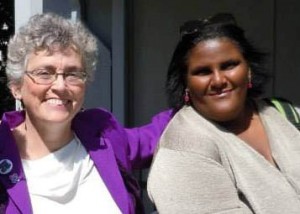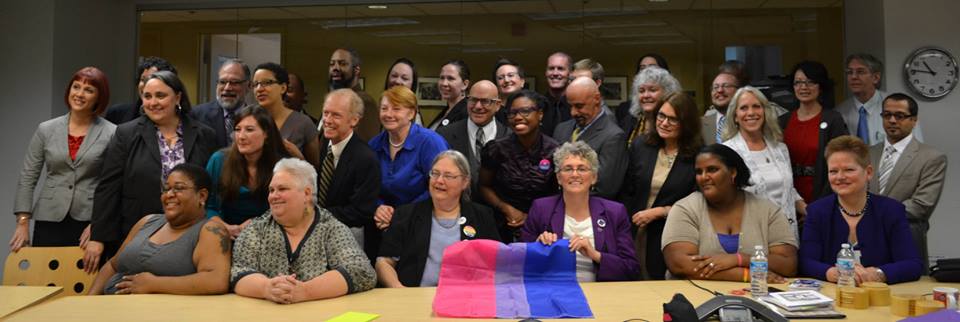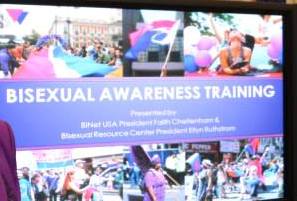If you knew bisexuals experience rape, partner violence, and stalking more than any other segment of our sexual orientations, would you keep silent? If you were offered a national platform to give voice to their stories, could these sad statistics be revealed without perpetuating the many hateful stereotypes about bisexuals?
I asked myself these questions as I prepared to join a contingent of 33 bisexual activists from around the country who were invited to speak with key members of the Obama Administration on September 23, 2013, known for almost 15 years as “Celebrate Bisexuality Day.” This was a significant opportunity on an auspicious day!

Ellyn Ruthstrom, President, Bisexual Resource Center, and Faith Cheltenham, President, BiNet USA, mobilized 33 bi activists to meet with Obama Administration officials.
For the first time ever, bi leaders were going to be very visible and their voices would be heard by public officials who make policies that affect us all.
With about one month to prepare, we divided into small, issue-focused groups and got to work preparing talking points on policy issues. My group’s mission was to cover domestic and intimate partner violence experienced by bisexuals. Others spoke on bullying and hate crimes, health, HIV/AIDS, employment and more. It was challenging to break the silence on domestic violence, while protecting the survivors’ anonymity and respecting their dignity.
Like the old gospel song says, we need to make “a way out of no way” to help all people feel valued and respected; to be safely visible while being bisexual.
After immersing ourselves in piles of research reports and assessing the state of domestic violence advocacy in this country, we realized that we needed to bring those hidden, invisible bisexual survivor voices directly into that Old Executive Office Building conference room. So we read brief excerpts from their stories.
When one battered woman from Chicago went looking for a safe place to live, she had not one, but two doors slammed in her face instead—because she was bisexual:
“The shelter staff told me I didn’t belong there, that they only served women abused by male partners. They referred me to a new gay community anti-battering project. That group also turned me away, saying that I was bisexual, not gay, so they couldn’t help me…What I felt too angry and defeated to say back then was, ‘why can’t services be designed with bisexuals in mind?’ If we design services sensitive to bisexuals, they end up being responsive to both heterosexual and gay people, don’t they?”
A young woman from Texas told us that when she was 13 her sexual abuser labeled her a bisexual as a way to control and molest her before she understood what it meant. “I instantly felt shamed.” We emphasized the disturbing and appalling statistics from the CDC’s 2010 National Intimate Partner and Sexual Violence Survey on victimization by sexual orientation: 61% for bisexual women as compared to 44% for lesbians and 35% for heterosexual women. The violence stats for men were 37% for bisexuals compared to 26% for gay men and 29% for heterosexual men.
As an adult, an intimate partner used her bi orientation to manipulate and control her. “…negative stereotypes about bisexuality helped spark his abuse of me, the trauma, complete isolation, and total dependence upon him at that time.”
Our last anecdote came from an older Maryland woman who married young and had several children. “My husband knew about my bi orientation before we married. It was not an issue,” she told us. “…soon after our marriage, he began to psychologically abuse me… I resolved to finish college so that I could have the self-sufficiency to leave him. In my senior year, he launched a custody battle; using my bi orientation to imply I was an unfit mother…I survived this trip through hell, but still have the scars. It feels much safer to pass as heterosexual. Even today, a bisexual orientation can still be used as a weapon.”
Why do many bisexuals opt to remain invisible? We distributed a Massachusetts social service group’s brochure that reads, “Does Your Partner Blame It on Your Bisexuality?” We covered the findings of a Seattle group’s[i] research: “shelters are simply not accessible; lesbian and bisexual women experience pernicious problems in their stays, and for almost every confidential shelter… gender-variant people and bisexual and gay men are explicitly ineligible for services.”
We emphasized the disturbing and appalling statistics from the CDC’s 2010 National Intimate Partner and Sexual Violence Survey on victimization by sexual orientation: 61% for bisexual women as compared to 44% for lesbians and 35% for heterosexual women. The violence stats for men were 37% for bisexuals compared to 26% for gay men and 29% for heterosexual men.
At the White House roundtable, I wanted to implore our government and our society to do the impossible: create/defend/empower humane solutions to domestic violence…to not stigmatize or ignore bisexual victims…to not blame depression, suicide, addiction, and workplace problems on people just for BEING bisexual.

Bisexuals were well-represented at the White House roundtable by our group of intrepid bi advocates.
Last month’s meeting was both a challenge and an honor to speak with high-level government officials on behalf of bisexual women and men. As a long-time Washingtonian and bisexual advocate, I totally understand the irony of lobbying for better treatment from the federal government, yet not holding our collective breath; of learning to celebrate bisexual pride in the midst of sorrow; of crafting anthems of resistance and insistence despite our fears.
Like the old gospel song says, we need to make “a way out of no way” to help all people feel valued and respected; to be safely visible while being bisexual.
Special thanks to the members of our bi roundtable team on Domestic and Intimate Partner Violence: Heron Greenesmith, Gary North, Chiquita Violette, Morgan Goode and Lindasusan Ulrich.
[i] From Connie Burke’s 2008 speech to an ABA group on LGBT domestic violence issues.
Tags: 2013, bisexual activists, bisexual awareness, bisexual invisibility, bisexual pride, bisexuality, Celebrate Bisexuality Day, domestic violence, intimate partner violence, September 23, White House roundtable meeting




[…] last month’s White House Roundtable on Bisexuality our team reported on bisexuals and domestic violence. Even we were shocked to find how disproportionately bisexual people are affected by intimate […]